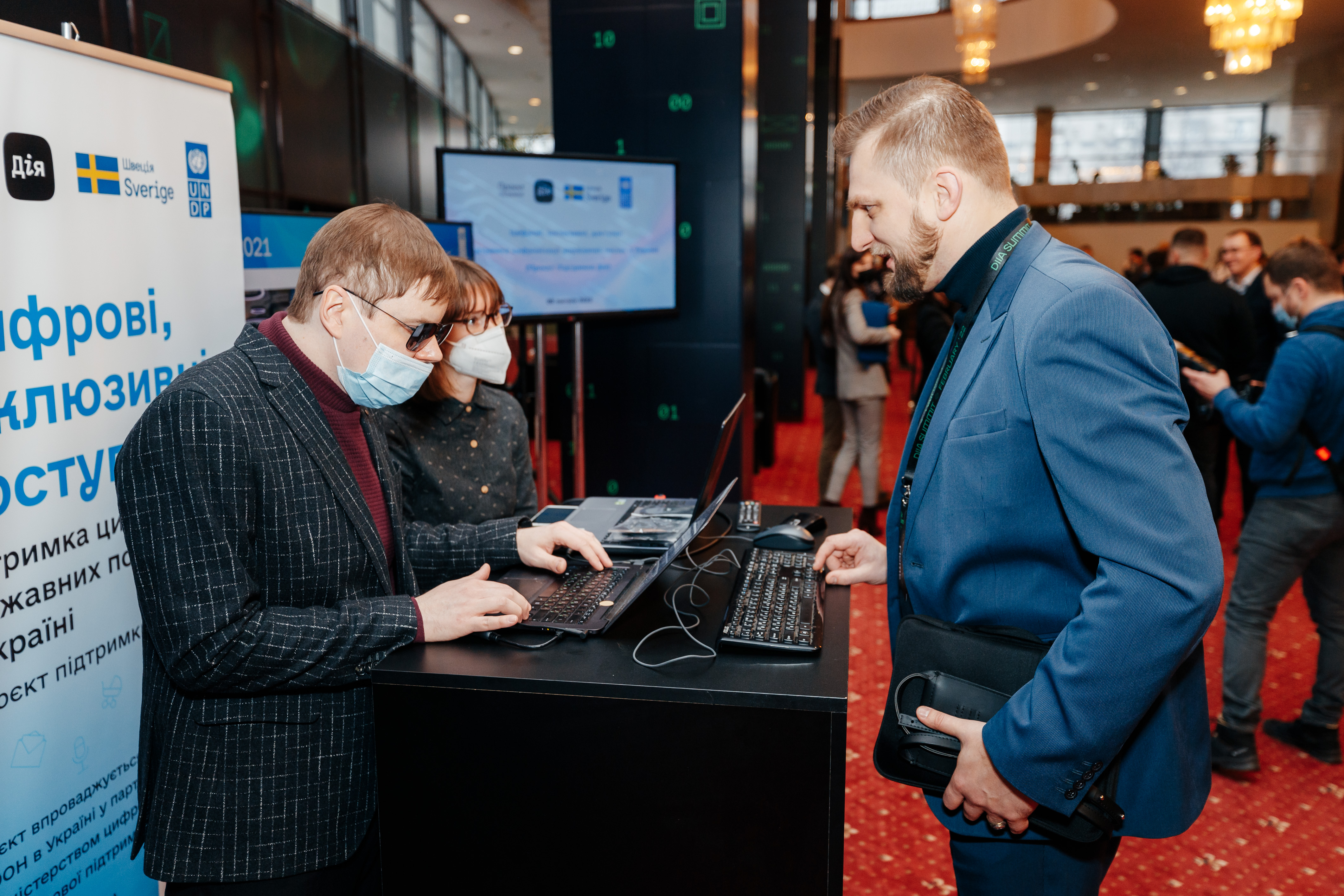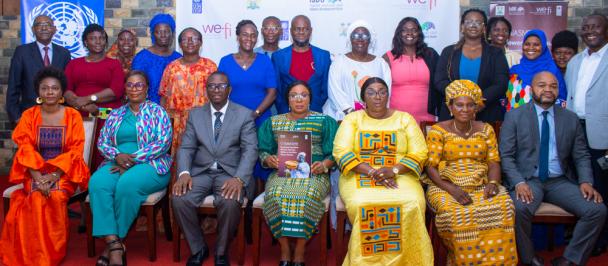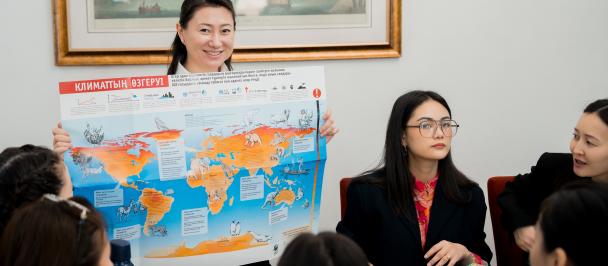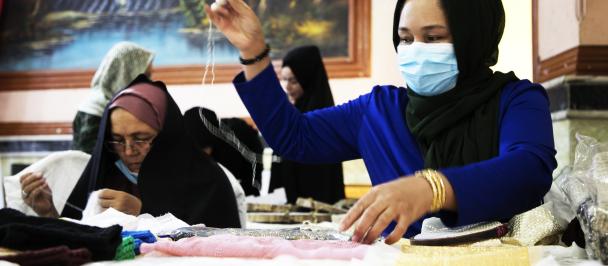UNDP project showcased at conference champions improved access to online services, crucial during war.
Ukraine highlights efforts to close digital divide for people with disabilities during New York conference
June 17, 2022

UNDP experts are showing visitors of the Diia Summit how to check the web accessibility of a website. Kyiv, 8 February 2022.
Kyiv, 17 June 2022 – Ukraine’s Ministry of Digital Transformation presented the country’s achievements in the field of digital accessibility during the 15th Conference of the States Parties to the Convention on the Rights of Persons with Disabilities in New York this week.
Yurii Matsyk, Head of the MDT’s Directorate of Fixed and Mobile Broadband, shared how people with disabilities are able to access online services as a result on the steps taken by the MDT with help from the United Nations Development Programme (UNDP) to increase the digital accessibility of web resources of government authorities and eliminate the digital divide in Ukraine.
The MDT is working to expand citizens' access to the Internet throughout the country, despite the war, and is implementing projects aimed at increasing the digital skills of Ukrainian men and women, Mr. Matsyk said.
In addition, the Ministry initiated the testing of web accessibility of public web resources, including that of Diia – the unified portal for online public services in Ukraine – as well as the development of a new state standard on web accessibility. Some of these initiatives have been implemented with the assistance of UNDP in Ukraine with financial support from Sweden.
“Digital accessibility is one of the priorities of Ukraine's public policy. Therefore, our work aims to increase web accessibility in the country, not only for people with disabilities, but for all citizens,” Mr. Matsyk said. “Our main goal is that the digital country should be accessible to all, and everyone should be able to receive access to the public services they need, and enjoy all of the benefits of the country's digital transformation.” In this regard he thanked Ukraine’s international partners for their support for the ministry's initiatives, and noted the expert and financial support given by both the United Nations Development Programme in Ukraine and by Sweden in the area of digital accessibility.
Ambassador Extraordinary and Plenipotentiary of Sweden to Ukraine Tobias Thyberg emphasized that Sweden consistently supports Ukraine in bridging the digital divide in the country, and in increasing the digital literacy of its citizens. “Developing the digital skills of Ukrainians and ensuring web accessibility when creating new web products is a guarantee that as many people as possible will be able to use public services,” he said. “Sweden is committed to supporting Ukraine on this path, so that the digital transformation will benefit all Ukrainian men and women”.
An integrated approach taken by the Government of Ukraine to improve people’s digital skills while increasing the web accessibility to all will help reduce the digital divide in Ukraine, said UNDP Ukraine Resident Representative, a.i. Manal Fouani. “In the last three years, the Government has taken unprecedented steps to increase the web accessibility of public resources and digital literacy,” Ms. Fouani said. “Progress in this direction is not stopping, even during the war. All these solutions and tools will certainly reduce and eliminate digital barriers in Ukraine. UNDP strongly believes that the digitalisation of public administration should be accessible to all people in the country, including people with disabilities, so that no one is left behind, especially during the war, and Ukraine’s progress is the best demonstration of this process.”
UNDP Ukraine, with the support of Sweden, has been working closely with the Ministry of Digital Transformation of Ukraine in the field of web accessibility in recent years. Among their recent achievements is the creation of a digital accessibility standard. The Ukrainian version of the EN 301 549 standard aims to ensure the web accessibility requirements for government websites match the ones that are mandatory in EU states. UNDP in Ukraine and Sweden also supported the participation of the Ministry of Digital Transformation in this year's Conference of the Parties to the Convention on the Rights of Persons with Disabilities.
Background
In late 2006, the United Nations General Assembly adopted the text of the Convention on the Rights of Persons with Disabilities. Its purpose was to encourage, protect and ensure the full and equal enjoyment of all human rights and fundamental freedoms by all persons with disabilities. The Convention stipulates that States parties shall meet regularly in a Conference in order to consider any matter with regard to the implementation of the Convention, and since 2008 there have been 15 sessions of the Conference of the States Parties at United Nations Headquarters.
The above-mentioned initiatives on web accessibility were conducted within the project “Digital, Inclusive, Accessible: Support to Digitalisation of Public Services in Ukraine Project” (DIA Support Project), which UNDP implements in Ukraine with the financial support of Sweden. The DIA Support Project was launched in 2021 and aims to bridge the digital divide between different generations and different social groups. Its main goal is to increase the accessibility of new digital solutions so that every man and woman in the country can use public electronic services and no one is left behind.
Media inquiries:
Yuliia Samus, Communications Team Leader, UNDP in Ukraine, yuliia.samus@undp.org

 Locations
Locations



